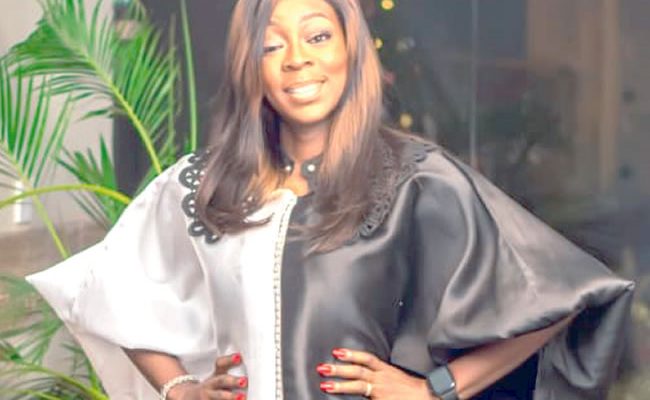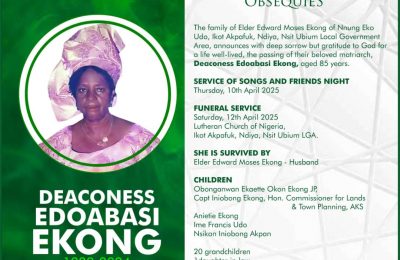Moronke Gbemiga-Ogundipe, the Chief Executive Officer of Sapphire Couture, a fashion establishment, is a designer and consultant that has aligned all levels of fashion chains to create a wholesome industry in almost two decades of existence. She speaks with YEJIDE GBENGA-OGUNDARE on the economic value of the fashion industry to the nation, women and leadership, women and economic empowerment as well as need for streams of income among other issues.
How does fashion help the average person in Nigeria?

Fashion provides opportunities for many Nigerians to start small businesses, such as tailoring, fashion retail, or production of accessories. Many average Nigerians earn a livelihood in the fashion industry, whether through small-scale tailoring or sales of clothing in markets. Fashion allows the average person to explore entrepreneurship by setting up small tailoring shops, fabric stores, or sales of fashion products. This not only creates jobs but also empowers individuals financially.
How do you think the fashion industry is important to the economy?
The fashion industry provides employment for a wide range of people, from designers and tailors to models, photographers, marketers and retail workers. In a country like Nigeria, where unemployment is a major issue, the industry plays a key role in offering job opportunities. The fashion industry stimulates growth in related sectors such as textile manufacturing, retail, advertising, and media. The demand for locally made fabrics and fashion accessories boosts local production, which reduces dependence on imports. The Nigerian fashion industry promotes the rich cultural heritage of the country through its use of traditional fabrics like Ankara, adire and Aso Oke, which are often fused with modern styles. This cultural promotion attracts tourists and international interest, thereby boosting the creative economy.
Is fashion a woman’s affair?
No, fashion is not just a “woman’s affair.” While historically, women have been more associated with fashion, it is an industry and form of self-expression that applies to everyone, regardless of gender. Here are some key points: fashion is not exclusive to women. It is a universal form of creativity and identity that involves men and women equally, both as participants and influencers. Fashion transcends gender, and both men and women contribute to and shape the fashion industry.
What are your thoughts about women in politics and leadership?
Despite Nigeria’s vast population and the importance of women in society, their representation in politics and leadership roles remains low. Historically, Nigerian politics has been male-dominated, and although there are some women in government, they occupy only a small fraction of leadership positions. This underrepresentation limits diverse perspectives in decision-making and governance. Having more women in political and leadership roles can inspire younger generations of women to pursue career in politics, activism, and leadership. Role models in leadership create a ripple effect, empowering more women to challenge existing norms and participate actively in the nation’s governance. While women in Nigeria face substantial barriers in politics and leadership, their inclusion is essential for balanced, effective governance and social development. Increasing the number of women in leadership positions will not only advance gender equality but also improve the overall quality of governance in the country.
Will you say the Nigerian society is fair to women?
Nigerian society is largely patriarchal, with traditional gender roles deeply ingrained. These cultural expectations often limit women’s opportunities for education, career advancement, and leadership. In many parts of Nigeria, women are expected to prioritise domestic responsibilities and family care, which can hinder their professional and personal growth. While there have been positive strides, Nigerian society is still not entirely fair to women due to persistent cultural, legal, and institutional challenges. Significant efforts are needed to address gender inequality and ensure that women are given equal opportunities and protection across all sectors of society.
What are your thoughts on women having streams of income?
Women having streams of income is not only empowering but absolutely essential for personal growth, financial independence, and societal progress. Here are key reasons why it is important for women to have multiple streams of income; having streams of income gives women financial independence which reduces reliance on others including spouses or family members. This independence allows women to make their own decisions, support themselves, and contribute to household finances.
Encouraging women to have streams of income is vital for their financial independence, security, and empowerment. It enhances their ability to support themselves, contribute to the society, and break gender stereotypes, ultimately leading to stronger families, communities, and economies. Women with multiple income streams are better positioned to thrive in today’s world, creating a more equal and prosperous society.
What are your expectations from the government towards boosting productivity in the Nigeria fashion industry?
The Nigerian government has a significant role to play in boosting productivity within the fashion industry. By providing access to funding, improving infrastructure, supporting local textiles, and promoting Made-in-Nigeria products, the government can create an enabling environment where fashion businesses thrive. Strengthening intellectual property laws, investing in training, and encouraging sustainable practices will further position Nigeria’s fashion industry as a global force. These measures would not only increase productivity but also generate employment, stimulate the economy, and enhance Nigeria’s cultural influence on the world stage.
Having spent almost two decades in the fashion industry, what lesson will you say you have learnt?
The fashion industry is constantly evolving, with trends, consumer preferences, and technology shifting rapidly. One major lesson is the importance of staying adaptable. You must be willing to embrace change, whether it’s in design, marketing, or the use of digital platforms. Stagnation can be detrimental, so continuous learning and adapting to new trends is essential for longevity.
The fashion business is as much about people as it is about products. Building a loyal customer base requires understanding your clients’ needs and delivering consistent quality. Listening to feedback and providing excellent customer service have been critical in retaining clients and growing the business. Happy customers are your best marketers. Above all, passion has been the driving force behind sustaining over a decade in the fashion industry. It’s an industry that requires hard work, long hours, and constant effort. Without passion for what you do, it can be difficult to keep going during tough times. Loving the craft and the process of creation has kept the fire burning.
Do you agree with the belief that women aid the violation and abuse of other women?
The belief that women sometimes aid in the violation and abuse of other women is a complex and sensitive issue. While it’s true that in some cases, women may contribute to the marginalization or mistreatment of other women, this is often a result of societal conditioning, structural inequality, or internalized norms rather than inherent malice. In some instances, women may fail to stand in solidarity with other women facing abuse or violation, either due to fear of repercussions or societal pressure. This lack of support can be perceived as aiding in the abuse, but it often stems from a lack of empowerment or fear of being marginalized themselves. Many women may not feel safe speaking out, especially in patriarchal societies where doing so can result in backlash or isolation. While it is true that in some instances women may contribute to the violation or marginalization of other women, this is usually a consequence of systemic issues such as patriarchy, societal pressures, and internalized gender norms. Rather than blaming women for aiding in the violation of others, it is essential to address the root causes: cultural conditioning, lack of empowerment, and societal structures that contribute to such behaviours.
READ ALSO: Kwara women farmers lament marginalization, seek govt’s support







